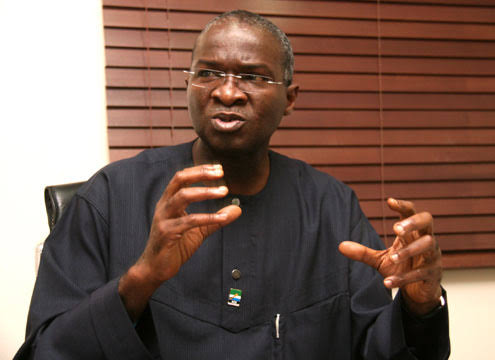The Minister of Works and Housing, Babatunde Fashola on Tuesday, disclosed that the Federal Government of Nigeria is currently owing contractors about N11.16tn for the construction of various highways across the country and certificates of completion.

Fashola Reveals FG Owing Contractors N11tn
Fashola stated this while defending the proposed budget of his ministry in the 2023 Appropriation Bill before the House of Representatives Committee on Works in Abuja.
He said his ministry had currently awarded 1,642 highway contracts for 1,632 projects at a total sum of N10.395tn.
The works and housing minister after his presentation before the committee said, “The main challenge to highways development in the country remains inadequate funding. As of date, the government is committed to highway contractors to the tune of about N10.4tn, while a total of about N765bn are unpaid certificates for executed works.
“Secondly, the shortage of younger engineers/technical officers in the ministry as a result of the embargo on employment is affecting proficient project supervision at the sites. It is expected that more sources of funding of highway projects be explored as well as lifting the embargo on employment of needed engineers/technical officers at middle level to enhance supervision of projects.”
Reading from his written presentation to the committee, the minister noted that the regime had built roads with a cumulative distance of about 8,000 kilometres out of the about 13,000 kilometres under (re)construction.
According to him, the ministry had documented the creation of 339,955 jobs across road projects, saying, “These are the human activities behind the kilometres (of road constructed).”
He further said that some of the jobs were created through lane marking covering 1,663,954 linear meters, “which was not visible on our roads before but you can now see them beginning to emerge.”
The minister also noted that 250,583 road signs were missing on the roads as of 2015.
Fashola noted that the construction companies had used 1,002,960,851 litres of diesel for various projects.
“Construction companies don’t buy diesel; they buy from the market. All of these suppliers are small businesses who benefit from and are impacted by what we do.”
The minister also said the contractors had used 1.6 million tonnes of cement, adding, “These are activities going on, impacting people beyond what we do here.”
He stressed that 512,000 tonnes of reinforcement, and 3,371,000 tonnes of bitumen, among other materials, had been used for the projects.
He further said, “It is to be noted that as of October 2022, the ministry had a cumulative unpaid certificate in the sum of N765.017bn for ongoing highway and bridge projects. Apart from the pressure of resources to pay, there is the inadequacy of annual budget provisions where N100m or N200m was provided for roads costing N20bn or more.
“In spite of all odds, 20 major highway projects have so far been completed in 2022 and are ready for commissioning. The total cost of the completed projects is in the sum of N444.322,123,808.61 and they cover a total length of 379.677km. Additionally, there are 59 major highways/bridges priority projects that are at an advanced level, to be completed within 2022-2023, with a total contract sum of N60,961,187,130.71.”
Fashola also noted that the ministry had initiated an intensive bridge maintenance programme to ensure the serviceability of the major assets, adding that bridges were critical structures that guaranteed connectivity across the federal road network.
“Some bridges have never been maintained since they were constructed over 40 years ago. Furthermore, illegal commercial (human) activities, which are detrimental to these national assets, contributed to their deterioration,” he stressed.
The minister said that the overhead cost of the ministry for 2022 was N627.001m, with N365.750m released from January to July, representing 58.33 per cent, with an outstanding sum of N261.250m.
In other news, Kanyi Daily reported that Fashola has claimed that President Muhammadu Buhari has built more infrastructure than United States government.




![American Rapper, Gunna Arrives In Nigeria For Lagos Concert [Video] 5 American Rapper, Gunna Arrives In Nigeria For Lagos Concert [Video]](https://media.kanyidaily.com/2024/12/21164103/Gunna-150x150.jpg)
![Williams Uchemba Gifts Wife A Rolex Watch After Welcoming Their Second Child [Video] 7 Williams Uchemba Gifts Wife A Rolex Watch After Welcoming Their Second Child [Video]](https://media.kanyidaily.com/2024/12/21160810/Williams-Uchemba-wife-150x150.webp)


![Over 20 People Killed In Stampede At Rice Distribution Event In Okija, Anambra [Video] 13 Over 20 People Killed In Stampede At Rice Distribution Event In Okija, Anambra [Video]](https://media.kanyidaily.com/2024/12/21131654/Anambra-stampede-150x150.jpg)




![Jarvis Vows To Return Peller's Engagement Ring Over His Relationship With UK Lady [Video] 23 Jarvis Vows To Return Peller's Engagement Ring Over His Relationship With UK Lady [Video]](https://media.kanyidaily.com/2024/12/21094158/Peller-Jarvis-150x150.jpg)

